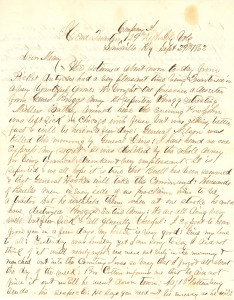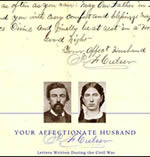 [google-map-v3 width=”400″ height=”300″ zoom=”12″ maptype=”hybrid” mapalign=”right” directionhint=”false” language=”default” poweredby=”false” maptypecontrol=”false” pancontrol=”false” zoomcontrol=”true” scalecontrol=”falso” streetviewcontrol=”false” scrollwheelcontrol=”false” addmarkermashupbubble=”false” addmarkerlist=”38.25486; -85.766404{}1-default.png” bubbleautopan=”true” showbike=”false” showtraffic=”false” showpanoramio=”false”]
[google-map-v3 width=”400″ height=”300″ zoom=”12″ maptype=”hybrid” mapalign=”right” directionhint=”false” language=”default” poweredby=”false” maptypecontrol=”false” pancontrol=”false” zoomcontrol=”true” scalecontrol=”falso” streetviewcontrol=”false” scrollwheelcontrol=”false” addmarkermashupbubble=”false” addmarkerlist=”38.25486; -85.766404{}1-default.png” bubbleautopan=”true” showbike=”false” showtraffic=”false” showpanoramio=”false”]
Head Quarters, Company A, 129th Regt. Ills. Vols.
Louisville, Ky., Sept. 29th 1862
Dear Mary
We returned about noon to-day from Picket duty. We had a very pleasant time being Quartered in a very beautiful grove. We brought one prisoner, a deserter from General Bragg’s Army. He reported Bragg retreating.1 Miller’s Battery arrived here this evening. Bro. John [Murphy] was left sick in Chicago with fever but was getting better fast & will be here in a few days.2 General Nelson was killed this morning by General Davis.3 I have heard no one express any regret. He was disliked by the whole Army for being tyrannical, drunken & very unpleasant.
It is reported, & we all hope it is true that Buell has been removed & that General Hooker will take this command.4 Thousands of Buell’s men on every side of us proclaim him to be a traitor; that he withheld them when at one stroke he could have destroyed Bragg’s entire army.5
We are all doing very well, but few sick & all generally cheerful. I expect to hear from you in a few days. My health is very good. Give my love to all. Yesterday was Sunday, yet I am sorry to say I did not think of it until nearly night. We were out early in the morning & marched out into the country. I was so busy that I forgot all about the day of the week. Bro. Cotton informs me that he did not find it out until he went down town.6 Adjt. Plattenburg sends his respects.7 He says you need not be uneasy as he will take care of me. He has brought his desk into our office & does business here which makes this the head quarters of the Regiment. Gagan arrived here day before yesterday.8 He brought news for a great many of the company, & I was rather disappointed, but I know you were unable to go out, & I presume the rest did not think of it or know he was coming.
I hope you are doing well & by this time able to get around & I earnestly hope the babe is well & flourishing; that you may not have much trouble; that your health may not be impaired. May the blessings of Heaven rest upon you all for which I shall ever pray; As it is time to go to bed, I must say Fairwell
Your affect. Husband
J. F. Culver
P.S. Our position has been changed today by an order from Head Quarters.9
- Pvt. A. A. Dunham of Company C reported that some of the men believed the prisoner to be a spy, and he was put in the lockup. The prisoner, in stating that Bragg was retreating, had given misleading information. On September 29 Bragg’s army was at Bardstown, where it had been for the past week, while Kirby Smith’s divisions were camped in and around Lexington. Bragg’s army on the 30th was increased by 8,000, when Maj. Gen. Carter L. Stevenson reached Danville from Cumberland Gap with his “fine” division. O.R., Ser. I, Vol. XVI, pt. II, pp. 889-891; Through the South with a Union Soldier, p. 22. [↩]
- Miller’s battery (Company M, 1st Illinois Light Artillery Regiment) had departed from Camp Douglas on September 27. Report of the Adjutant General of the State of Illinois, Containing Reports for the Years 1861 -66 (Springfield, 1886); Vol. VIII, p. 665. [↩]
- On the morning of the 29th, Maj. Gen. William “Bull” Nelson had breakfasted at the Galt House and was standing at the desk, when Governor Oliver P. Morton of Indiana, accompanied by Brig. Gen. Jefferson C. Davis and two other men, entered the lobby. Davis, “a small, sallow, blue-eyed, dyspeptic-looking man, less than five feet nine inches high, and weighing only about one hundred and twenty-five pounds,” accused the powerfully-built, ex-naval officer Nelson of having insulted him at their last meeting.
“Go away”, the six-foot-four, 300-pound Nelson snapped, his manner expressive of his contempt for Davis. Other words followed, and Nelson slapped Davis with the back of his hand. He then turned his back on Davis and walked to the stairway. As he did, Davis secured a pistol from one of his companions and shot Nelson to death. McDowell, City of Conflict, pp. 99-101. [↩] - In Washington, officials at the War Department had become disenchanted with Buell’s
conduct of the Kentucky Campaign. On September 24 the decision was made to relieve
General Buell and replace him with General Thomas, provided that: (a) the army was not
in the presence of the enemy; (b) Buell had not gained a victory; or (c) Thomas was too far
separated by geography to enter upon command of the army. The staff officer entrusted
with this confidential dispatch, signed by General in Chief Henry Halleck, reached
Louisville on the 29th. General Thomas, taking the position that Buell had completed
preparations to move against the foe, telegraphed Halleck, asking that Buell be retained in
command.
President Lincoln and his advisors, in view of Thomas’ unwillingness to assume the responsibility, reconsidered their decision to sack Buell. Before the day was over, Halleck had drafted and forwarded a telegram, directing that the order changing commanders be suspended. O.R., Ser. I, Vol. XVI, pt. II, pp. 538-539, 554-555.
The story reaching J.F.C. that Buell was to be replaced by Maj. Gen. Joseph Hooker, the popular commander of the Army of the Potomac’s I Corps, was a garbled version of what was transpiring at army headquarters. [↩] - Col. J. C. McKibbin, the staff officer entrusted with the order relieving Buell, reported,
there is “much dissatisfaction with General Buell” and “no probability of a fight within a
week.” Ibid., p. 554. [↩] - Thomas Cotton, a 36-year-old minister, had enlisted as a corporal in Company K, 129th Illinois, at Pontiac on Aug. 2, 1862. When the regiment was mustered into federal service for three years, on Sept. 8, he was appointed chaplain. Cotton resigned on Aug. 6, 1864, because he was suffering from “bilious derangement,” which had been aggravated by the terrible Georgia climate. This disability had induced a certain amount of nervous depression, which made it impossible for him “to move through the regiment with that glow of mental and social energy” that enabled him to succeed in his work. Compiled Service Records of Union Soldiers, NA. [↩]
- Philip D. Plattenburg, of Pontiac, Illinois was 31 years old when he enlisted on Aug. 15, 1862, as a private in Company K, 129th Illinois. He was mustered in for three years’ service, and appointed regimental adjutant on Sept. 8, 1862. Adjutant Plattenburg served with the regiment throughout the war and was mustered out at Washington, D.C., on June 8, 1865. Ibid. [↩]
- William Gagan, a 29-year-old Irish newspaperman, had been appointed regimental sutler on Sept. 9, 1862, by Col. G. P. Smith. Eighth Census, Livingston County, State of Illinois, N A ; Regimental Papers, 129th Illinois, NA, RG 94. [↩]
- The death of Nelson and the need to improve the organization of the army resulted in a sweeping reorganization on September 29. The divisions camped in and around Louisville were organized into three corps to be commanded respectively by Maj. Gens. Alexander McD. McCook, Thomas L. Crittenden, and Charles C. Gilbert. Chapin’s brigade was redesignated the 38th and assigned to Brig. Gen. Ebenezer Dumont’s Twelfth Division. Dumont’s division was not given a corps assignment and would report to headquarters, Army of the Ohio. O.R., Ser. I, Vol. XVI, pt. II, pp. 558-559, 595; Regimental Papers, 129th Illinois, NA, RG 94. [↩]

 Subscribe via RSS
Subscribe via RSS Subscribe via Email
Subscribe via Email